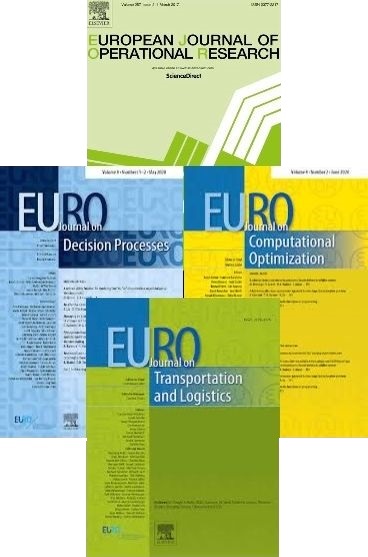EURO Doctoral Dissertation Award (Guidelines)
Policy
If there is a suitable recipient, the prize is awarded annually to an early stage scientist on the basis of a doctoral dissertation in any area of Operational Research. Early stage scientists are either PhD students or scientists having less than two years research experience since completing a PhD.
Award
The jury selects a short-list of finalists who will present their work in a special session of the EURO-k Conference or relevant Conference selected for a non-EURO-k year. There is no registration fee for each finalist. EURO will also contribute to the travel and accommodation expenses. The winner will be determined by the jury at the end of the special session(s) and will be announced by the chair of the jury during the closing session of the Conference.
The prize for the winners is a distinct honour, and in material terms consists of €1,000 and a certificate.
Eligibility
The entries will consist of doctoral dissertations that were completed after the competition deadline of the previous EURO Doctoral Dissertation Award. The dissertation must have been defended in a university located in a member country of EURO. The author of the dissertation must be a member of a member society of EURO.
Applications
All applications should be submitted online by the due date set in the announcement.
To be considered, a dissertation should be nominated by the supervisor of the thesis (one of them in the case of multiple supervisors). The supervisor of the dissertation is asked to provide the jury with the following information, as far as possible in electronic version:
- The text of the dissertation.
- An extended abstract (3 to 5 pages) of the dissertation; this abstract should be written in English and should include precise keywords.
- If the dissertation is not written in English, a paper in English authored (or co-authored) by the author of the dissertation and describing the core ideas of the thesis. This paper should preferably have been published in or submitted to an international journal.
- Nomination letters (or reports) from two referees selected by the dissertation supervisor, supporting the submission and stating their assessment of why the thesis should win the award.
- An up-to-date CV of the candidate, including a list of publications.
No nomination will be considered without these items.
Selection jury
The selection jury consists of five members of recognized stature in the OR community. The jury includes a core of three members who serve normally a period of three prizes, with one member added at each prize edition. The new member is nominated by the EURO Executive Committee (suggestions will be asked to the jury core) and approved by the EURO Council. The chair is normally the member who is in the final year of service. The EURO EC then selects additionally two members serving only for the current prize edition and keeps the EURO Council informed about the decision. One of these additional members may be proposed by the award sponsor, where relevant. Care should be taken to make sure that the selection committee is representative of the various areas of OR. The jury members must be members of one of the EURO member societies.
If any member of the award jury has a past or current relationship with a nominee that might influence the selection process for reasons other than the merits of the case relative to the award, it is the responsibility of each jury member to bring to the attention of the jury chair such a conflict of interest. The jury chair should propose a response that ensures that the final decision of the jury is exempt from any conflict.
Selection process
Only one award may be made on each occasion.
Then, the selection process consists of two phases.
Phase 1:
In the year prior to each EURO-k Conference or relevant Conference selected for a non-EURO-k year the EURO Doctoral Dissertation Award jury will place a call for nominations on the EURO website. The jury selects a shortlist of three finalists. In its evaluation, the jury takes the following criteria into account:
- Originality and novelty of the subject;
- Pertinence of the subject for OR;
- Depth and breadth of the results;
- Contributions of the dissertation to the theory and practice of OR;
- Applications and/or potential applicability of the results;
- Impact on related fields;
- Quality of the related publications.
Phase 2:
These finalists are invited to present their contribution in front of the jury and any other interested participants during a special EDDA session scheduled at the EURO-k conference or relevant Conference selected for a non-EURO-k year. The jury selects the final winner after the session(s).
Time Line for the EURO Doctoral Dissertation Award
| t - 2 years | New member proposal by the jury core. Approval of the EDDA jury core new member by the EURO Executive Committee and EURO Council. |
| t - 1,5 year | Selection of additional jury members by the EURO Executive Committee. |
| t - 1 year | EURO Executive Committee keeps EURO Council informed about the additional jury members. Call for applications by EDDA jury chair/EURO office. |
| t - 5 months | Deadline for applications. |
| t - 4 months | Decision of the jury, the jury chair informs the EURO Office. The EURO Office contact the finalists to inform them about the special session(s) and make arrangements for their registration. |
| t | Conference: presentation by each finalist, final selection, award delivery. |
[Latest guidelines approved July 2024 (changed to schedule annually)]

This work is licensed under a Creative Commons Attribution-ShareAlike 3.0 International License and the GNU Free Documentation License (unversioned, with no invariant sections, front-cover texts, or back-cover texts).
